华南理工大学2016年《359日语翻译基础》考研专业课真题试卷
华南理工大学359日语翻译基础2017年考研专业课真题试卷

359 华南理工大学
2017 年攻读硕士学位研究生入学考试试卷
(试卷上做答无效,请在答题纸上做答,试后本卷必须与答题纸一同交回)
科目名称:日语翻译基础 适用专业:日语笔译(专硕)
問題一.次の単語を中国語に訳しなさい。(1点×15問=15点) 1.UNESCO 2.WTO 3.ASEAN 4.BRICs 5.レクサス 6.アレルギー 7.パフォーマンス 8.ビジネスチャンス 9.リーマンショック 10.ウィンウィン関係 11.国交正常化 12.グリーンフィールド型の投資 13.百聞は一見にしかず 14.三人寄れば文殊の知恵 15.己の欲せざるところは人に施すなかれ
2.各位中国的朋友们,大家好!我是北海道的知事高桥。在中国有很多观众都看过
第2页
华南理工大学2017年考研专业课真题试卷(原版)
《非诚勿扰》这部电影,对里面出现的我们的故乡北海道的关注度也不断上升。对此 我们北海道感到非常高兴。我想向大家推荐我们北海道的三样东西。一个就是在春天 开放的芝樱。接下来就是北海道美味的食品。北海道四周全是海,所以海产品非常丰 富,非常好吃。例如三文鱼、螃蟹、扇贝、还有《非诚勿扰》里面介绍的海胆,都是 北海道特别好吃的海鲜。希望中国朋友一定要来看一看,尝一尝。
[考研类试卷]2016年华南理工大学翻译硕士英语真题试卷.doc
![[考研类试卷]2016年华南理工大学翻译硕士英语真题试卷.doc](https://img.taocdn.com/s3/m/8bae897bf4335a8102d276a20029bd64783e62cf.png)
[考研类试卷]2016年华南理工大学翻译硕士英语真题试卷.doc[考研类试卷]2016年华南理工大学翻译硕士英语真题试卷一、Vocabulary1 If you keep on trying something, the day will come when you can do it well and with great______.(A)care(B)ease(C)tempo(D)dignity2 She______to find new stories about her homeland, making sure her American-born daughter did not grow up ignorant of Chinese culture.(A)dropped out(B)went out of her way(C)gave way(D)got down3 In the past, a woman's world usually______household work and waiting for her children and husband to come home.(A)made up(B)composed of(C)was comprised of(D)consisted of4 Domestic tourists now make up more than 90 percent of the country's totaland______two-thirds of its total tourism earnings.(A)attribute(B)contribute(C)distribute(D)dispatch5 He is a diligent and______teacher, well liked by his students.(A)voluntary(B)conscious(C)conscientious(D)hard6 The doctor tried last time to explain to the Browns that infants and young children are more ______to the effects of secondhand smoke than adults.(A)conducive(B)advantageous(C)delicate(D)vulnerable7 It is absolutely true today that college degrees have become a valuable ______ for jobseekers in the country's developing market economy.(A)asset(B)liability(C)deterrent(D)means8 She is far too______to believe these ridiculous lies.(A)sensational(B)sensitive(C)sensible(D)sensuous9 With______audiences and less financial support from government, Britain's best orchestras must find new sources of income, if they are to continue.(A)shrinking(B)captive(C)withering(D)sympathetic10 On July 1, 1997, China resumed the exercise of sovereignty over Hong Kong, wiping out 156 years of colonial humiliation______on the Chinese nation.(A)befell(B)imposed(C)afflicted(D)leased11 Johnson______the problem in his mind for two more days before he came to a conclusion.(A)turned on(B)turned over(C)turned out(D)turned to12 Many of the works exhibited in the gallery are______, filled with energy and vitality, bright colors and unique ways of expressing ideas.(A)imaginative(B)imaginable(C)imagined(D)imaginary13 Words fail to______our feelings of great reverence for the hero.(A)imply(B)deliver(C)convey(D)contain14 China is______an ambitious plan to stimulate the domestic economy by investing in infrastructure construction , of which telecommunications are an important part.(A)undertaking(B)supervising(C)foiling(D)compiling15 I have to______time to prepare for the coming sports meet.(A)set about(B)set aside(C)set up(D)set off16 If not properly______, border issues which are always very sensitive and complicated international relations can often trigger conflicts.(A)handled(B)handing(C)handle(D)to handle17 After______seemed an endless wait, it was his turn to enter the personnel manager's office.(A)what(B)it(C)that(D)there18 Every change of season, every change of weather ______ some change in the wonderful colors and shapes of these mountains.(A)make(B)makes(C)is making(D)are making19 There______nothing more for discussion, the meetingcame to an end half an hour earlier.(A)to be(B)to have been(C)be(D)being20 Variables such as individual and corporate behavior______nearly impossible for economists to forecast economic trends with precision.(A)make it(B)make(C)it makes(D)makes it21 Had Jane been more careful on the math exam, she______much better results now. (A)would be getting (B)could have got(C)must get(D)would get22 By the year 2030, it's estimated that more than two thirds of the world's population will be living in cities —______today.(A)twice as many as(B)as twice as many(C)as much as twice(D)as much twice as23 My daughter has walked eight miles today. We never guessed that she couldwalk______far.(A)/(B)such(C)that(D)as24 Much______I like Antonia, I hated the superior tone that she sometimes took with me. (A)although(B)since(C)for(D)as25 Developing friendly ties with neighborly countries is the priority aim of this country's foreign policy and this policy will not be changed______the international situation may be.(A)whichever(B)however(C)wherever(D)whatever26 The snow leopard is a class-one endangered species, ______is the giant panda. (A)as(B)such(C)which(D)that27 Jeremy came to visit me again. It was the second time he______me that afternoon. (A)had been interrupting (B)has interrupted(C)would have interrupted(D)had interrupted28 Grace's eyes were wet with tears as she put her face______she could, gripping my left hand and stroking it.(A)as close as to mine(B)so close to mine as(C)as close to mine as(D)much so close as29 The boys in the family are old enough for______.(A)school(B)schools(C)the school(D)the schools30 Intellect is to the mind______sight is to the body.(A)as(B)what(C)like(D)that二、Reading Comprehension30 [1] T o say that the city is a central problem of American life is simply to know that increasingly the cities are American life; just as urban living is becoming the condition of man across the world. Everywhere men and women crowd into cities in search of employment, a decent living, the company of their fellows, and the excitement and stimulation of urban life.[2] Within a very few years, 80 percent of all Americans will live in cities — the great majority of them in concentrations like those which stretch from Boston to Washington, and outward from Chicago and Los Angeles and San Francisco and St. Louis. The cities are the nerve system of economic life for the entire Nation, and for much of the world.[3] And each of our cities is now the seat of nearly all the problems of American life: poverty and race hatred, stunted education and saddened lives, and the other ills of the new urban Nation — congestion and filth, danger and purposelessness —which afflict all but the very rich and the very lucky.[4] ...The city is not just housing and stores. It is not just education and employment, parks and theaters, banks and shops. It is a place where men should be able to live in dignity and security and harmony, where the great achievements of moderncivilization and the ageless pleasures afforded by natural beauty should be available to all. If this is what we want — and this is what we must want if men are to be free for that "pursuit of happiness" which was the earliest promise of the American Nation —we will need more than poverty programs, housing programs, and employment programs, although we will need all of these. We will need an outpouring of imagination, ingenuity, discipline, and hard work unmatched since the first adventurers set out to conquer the wilderness. For the problem is the largest we have ever known. And we confront an urban wilderness more formidable and resistant and in some ways more frightening than the wilderness faced by the pilgrims or the pioneers.[5] One great problem is sheer growth —growth which crowds people into slums, thrusts suburbs out over the countryside, burdens to the breaking point all our old ways of thought and action — our systems of transport and water supply and education, and our means of raising money to finance these vital services.[6] A second is destruction of the physical environment, stripping people of contact with sun and fresh air, clean rivers, grass and trees — condemning them to a life among stone and concrete, neon lights and an endless flow of automobiles. This happens not only in the central city, but in the very suburbs where people once fled to find nature. "There is no police so effective," said Emerson, "as a good hill and a wide pasture... where the boys...can dispose of their superfluous strength and spirits." We cannot restore the pastures, but we must provide a chance to enjoy nature, a chance for recreation, for pleasure and for some restoration of that essential dimension of human existence which flows only from man's contact with the naturalworld around him.[7] A third is the increasing difficulty of transportation —adding concealed, unpaid hours to the workweek, removing men from the social and cultural amenities that are the heart of the city; sending destructive swarms of automobiles across the city, leaving behind them a band of concrete and a poisoned atmosphere. And sometimes — as in Watts — our surrender to the automobile has so crippled public transport that thousands literally cannot afford to go to work elsewhere in the city.[8] A fourth destructive force is the concentrated poverty and racial tension of the urban ghetto — a problem so vast that the barest recital of its symptoms is profoundly shocking: Segregation is becoming the governing rule; Washington is only the most prominent example of a city which has become overwhelmingly Negro as whites move to thesuburbs; many other cities are moving along the same road — for example, Chicago, which, if present trends continue, will be over 50 percent Negro by 1975. The ghettoes of Harlem and Southside and Watts are cities in themselves, areas of as much as 350, 000 people.Poverty and unemployment are endemic: from one-third of the families in these areas live in poverty, in some, male unemployment may be as high as 40 percent; unemployment of Negro youths nationally is over 25 percent.Welfare and dependency are pervasive: one-fourth of the children in these ghettoes, as in Harlem, may receive Federal Aid to Dependent Children; in New York City, ADC alone costs over $ 20 million a month; in our five largest cities, the ADC bill's over $ 500 million a year.Housing is overcrowded, unhealthy, and dilapidated: the lasthousing census found 43 percent of urban Negro housing to be substandard; in these ghettoes, over 10, 000 children may be injured or infected by rat bites every year.Education is segregated, unequal, and inadequate: the high school dropout rate averages nearly 70 percent, there are academic high schools in which less than 3 percent of the entering students will graduate with an academic diploma.Health is poor and care inadequate: infant mortality in the ghettoes is more than twice the rate outside, mental retardation among Negroes caused by inadequate prenatal care is more than seven times the white rate; one-half of all babies born in Manhattan last year will have had no prenatal care at all; deaths from diseases like tuberculosis, influenza, and pneumonia are two to three times as common as elsewhere.[9] Fifth is both cause and consequence of all the rest. It is the destruction of the sense, and often the fact, of community, of human dialog, the thousand invisible strands of common experience and purpose, affection and respect which tie men to their fellows. Community is expressed in such words as neighborhood, civic pride, friendship. It provides the life-sustaining force of human warmth and security, a sense of one's own human significance in the accepted association and companionship of others.[10]/doc/5d3837163369a45177232f60ddccda 38376be1f5.html munity demands a place where people can see and know each other, where children can play and adults work together and join in the pleasures and responsibilities of the place where they live. The whole history of the human race, until today, has been the history of community. Yet, this isdisappearing, and disappearing at a time when its sustaining strength is badly needed. For other values which once gave strength for the daily battle of life are also being eroded.[11] The widening gap between the experience of the generations in a rapidly changing world has weakened the ties of family; children grow up in a world of experience and culture their parents never knew.[12] The world beyond the neighborhood has become more impersonal and abstract. Industry and great cities, conflicts between nations and the conquests of science move relentlessly forward, seemingly beyond the reach of individual control or even understanding.[13] ...But of all our problems, the most immediate and pressing, the one which threatens to paralyze our very capacity to act, to obliterate our vision of the future, is the plight of the Negro of the center city. For this plight and the riots which are its product and symptom —threaten to divide Americans for generations to come; to add to theever-present difficulties of race and class the bitter legacy of violence and destruction and fear....[14] It is therefore of the utmost importance that these hearings go beyond the temporary measures thus far adopted to deal with riots — beyond the first hoses and the billy clubs; and beyond even sprinklers on fire hydrants and new swimming pools as well. These hearings must start us along the road toward solutions to the underlying conditions which afflict our cities, so that they may become the places of fulfillment and ease, comfort and joy, the communities they were meant to be.31 According to the passage, everywhere men and women crowd into cities in searchof______.(A)employment and race hatred(B)a decent living and stunted education(C)congestion and the company of their fellows(D)the excitement and other advantages of urban life32 It can be learned that within a few years, ______of all Americans will live in concentrations like those which stretch from Boston to Washington, and outward from Chicago and other cities.(A)less than 80 percent(B)about 80 percent(C)more than 80 percent(D)none of the above33 Besides poverty, housing and unemployment programs, Americans need______to attain the kind of society they want.(A)imagination(B)ingenuity(C)discipline and hard work(D)all of the above34 According to the author, the city should be______.(A)the seat of nearly all the problems of American life(B)just houses, stores, schools, businesses, parks, and theaters(C)place where people can live in dignity and security and harmony(D)the nerve system of political, economic, cultural life for much of the world35 The major city problems discussed in the passage include all of the following EXCEPT______.(A)racial tension and the destruction of the sense ofcommunity(B)sheer growth and destruction of the physical environment(C)the difficulty of transportation and concentrated poverty(D)unpaid working hours and a poisoned atmosphere36 The most prominent example of a city which has become overwhelmingly Negro is______.(A)New York(B)San Francisco(C)Chicago(D)Washington37 Which of the following statement is NOT true?(A)20 percent of the children in ghettos may receive Federal Aid to Dependent Children.(B)Male unemployment in some areas may be as high as 40 percent.(C)43 percent of urban Negro housing is substandard.(D)In ghettos, the high school dropout rate averages nearly 70 percent.38 The reason why the plight of the Negro is the most immediate and pressing problem is that it threatens______.(A)to paralyze the American economy(B)to divide Americans for generations to come(C)to destroy the vision of the future generations(D)to use violence in overthrowing the old belief and social system39 According to the author, the sense of community chiefly means______.(A)the ties of family(B)a thousand imaginable strands(C)things which tie men to their fellows(D)the values which once gave strength for the daily battle of life40 In this selection, the author makes______work for him to order the materials so that it is easy to follow.(A)description(B)classification(C)definition(D)narration40 [1] When I first saw Pippa the cheetah, she was sitting pertly on a chair in the tearoom of the New Stanley Hotel in Nairobi. I had gone to meet her owners, an English couple who were leaving Kenya and wanted to ensure that their pet would find a good home. Pippa was wearing a harness and was able to sit at a table, looking as if she might have a soft drink through a straw. She was a thoroughly spoiled cub.[2] Eighteen months later she had returned to the wild. She was living in the Northern Frontier District where she had been born. She had learned to hunt for herself, had mated with a wild cheetah, and was raising a litter of cubs.[3] Pippa's rehabilitation to the wild required patience, perseverance, love, and the same kind of respect for her as a being that I would have offered a fellow human. I had previously shared this love and respect with Elsa the lioness, whom my husband George and I had raised as a cub. But it was not simply a matter of affection — although there was plenty of that. The rehabilitation process was important as an experiment in developing a means of trying to guarantee the survival of endangered species. The cheetah is one of these; the lion maybecome one soon.[4] I learned many things from Elsa and Pippa. They proved always to be interesting and affectionate companions. And I enjoyed the closeness to nature that the rehabilitation process required. But there were raany times when I was working with Elsa and Pippa, and there have been many times since, when I have wondered about another endangered species, a species generally as ignorant of the threat to its survival as these two cats had been. That species is man.[5] Some recent scientific, economic, and political research suggests that the curves for food demand and food supply will cross in a maximum of 60 years. By then, man's overpopulation, increasing pollution, and the diminishing food supply could threaten to end human life on our planet. Being aware of this research, I could not help wondering what steps man could take to ensure his survival. Could he, for instance, learn from animals something about birth control, inter-creature relationships, or thought communication that would help him avoid extinction?[6] Generally, the first reaction to such musings is one of astonishment. The question phrases itself. What can man, the most highly evolved species of animal life, learn from less developed creatures? Astonishment at this question itself suggests a starting place. Perhaps man needs to regain his humility — and his sense of perspective. Perhaps he should look at himself as just another experiment of nature, no more important intrinsically than the thousands of other species evolved on our planet. Man is, after all, a fairly recent development. He has lived on earth only 1. 7 million years — not a very long time compared with the 400 million years of somecreatures.[7] Man's achievements during this stay are astounding. Yet they endanger his own survival. As a result, he may disappear as have other species who became too overspecialized, or outlived their environment. Perhaps more than any other creature man is notable for his constant violations of the eternal law of living in harmony with nature. Man kills everything that competes with him for living space or food. He has irreparably damaged his environment. He has forsaken nature's basic laws, substituting for them his own man-made laws and values. He has, for example, invented money —and now he gauges success, power, and achievement almost exclusively in terms of it. He overestimates his ego and his capacities. He worships status and sacrifices fantastically for it.[8] A more rational perspective would see that all organic life is of equal importance. That every species has its role to play. That nothing survives unless it fits into the balance of nature and lives within its environment. That all life must work together to preserve life and maintain ecology.[9] But man can also learn more specifically from animals. With his research capacity he can ask himself : How were animals able to maintain the balance of nature for more than 400 million years? Once he has unlocked these secrets, he can try to apply them to his own situation.[10] What are some of these secrets? Birth control is one. Animals have very efficient means of controlling their reproduction. We who study animals have learned about it only in the last few years. We don't yet know how it works, but we do know some facts. Most antelopes, for example, can withhold their young for weeks, even months. They do this in order that birthsoccur with the arrival of the rains, the availability of grazing, and the mothers' adequate supply of milk for the young.[11] Elephants seem able to adjust their reproduction in somewhat the same way. On the Victoria Nile, for instance, one bank is extremely eroded; it provides barely enough food for the elephants living there. The opposite bank, on the other hand, is quite well covered with vegetation. Observations indicate that elephants on the grassy bank calve every four years, while those on the eroded bank do so only every nine.[12] My own observations of Elsa and Pippa have revealed some most interesting facts. These cats come into season every five to seven weeks. Once the first litter has been born, they have the capacity to produce a new litter every three and a half months, and some zoo-confined lionesses actually do produce litters this of-ten. But in their natural state, females of these species will not let a male near them — let alone mate with him — while they are engaged in rearing their young to complete independence. Among lions this period lasts two years; among cheetahs it is about seventeen and a half months.[13] When Pippa lost two litters to predators a few days after their birth, she instantly looked for a mate and conceived despite the fact she had hardly recovered from giving birth. Knowing that her unfortunate cubs did not need her anymore, she lost no time in starting a new litter. This also happened with a lioness I knew.[14] Judging from this behavior, I can only assume that some kind of psychological block stops mother lions and cheetahs from wanting to mate while they are preoccupied with training their young.[15] Another secret of animals' survival is telepathy. This sense has become atrophied in man, but a definite thought-communication functions in animals. Elsa the lioness frequently sensed when George and I intended to visit her camp, even though it lay 180 miles from our home in Isiolo. On most occasions when we made our irregular visits she was waiting for us. By following her spoor we discovered that she had sometimes walked 50 or 60 miles to meet us.[16] The same thing happened when I took Elsa's two sisters to Nairobi to be flown to the Rotterdam zoo. Elsa stayed behind with George in Isiolo 180 miles away. He did not know when I was coming back; no person knew. But Elsa knew. On the morning of my return she sat down in the entrance drive and would not budge until I arrived in the evening.[17] I have known this kind of thought-communication with the animals with whomI've lived. When Elsa died, I woke in the night, knowing what had happened, even thoughI was several hundred miles away. The same thing occurred later with one of Pippa's cubs.[18] I don't possess this sensitivity with my own kind. I feel far more in tune with what is going on when I am in the bush than when I am in London or Nairobi. We don't know much yet about this telepathy —from which gland it comes, or how it works. But if men could reawaken or cultivate it in themselves, and then cooperate by trusting each other, rather than fearing and treating one another suspiciously, the world would be a far better place.[19] Another secret of the animals is embodied in a basic law of nature which men often ignore. Every animal has around him a security zone. Within that zone he feels safe. Simple observation shows what happens to creatures whose sense ofadequate living space has been consistently violated, and who have thus become degenerate. You only have to go to a zoo. There you find animals sitting like prisoners, tucked so close togetherthat it is not surprising they become frustrated and sometimes so tense that they try to break out. Then they have to be destroyed.[20] When people see animals in this condition, they get the impression that the animals are either dangerous and aggressive or, if they have fallen into a state of utter despair, that they are lethargic or stupid. But animals that I have known in their natural state are never like this. This illustrates why zoos — even the best zoos — cannot solve the problem of recovering a healthy survival number of presently endangered species.[21] The security-zone sense, the need for adequate living space, is not limited to wild animals. Men once possessed it as well. But now our awareness of it has grown so faint that four or five people can live together in one room, a situation which repeatedly occurs in overcrowded slums. People living in these conditions often become aggressive —sometimes even criminal — for the same reason that animals do in zoos.[22] Man-made values account not only for man's reduced awareness of his own security zone. They have also impaired a whole range of relationships which nature had placed in proper perspective. One of these, referred to earlier, is mating. Another is the relationship of mother to young. So many modern human mothers these days prefer to have jobs and put their children in day-care centers or kindergartens, rather than look after them. In nature this happens only in perverted cases. I have watched many animal mothers with their young. They are devoted to them andtend them with affection — and discipline. But they don't overdo it. Elsa and Pippa loved their cubs, but they also kept strict behavior. There was no nonsense about it.[23] Man's great challenge at this moment is to prevent his exodus from this planet. If he wants to survive — which he can do only if all other forms of life around him survive as well — he simply has to see himself as no more important than his fellow creatures. Since man has a higher intelligence than most animals, he is responsible for insuring their survival and thus maintaining life on our planet.[24] I personally doubt that man can recover his original relationship with all other forms of life unless he reappraises his man-made values, returns again to the rules of nature, and then accepts and obeys them.41 The main idea of this article is that______.(A)people can teach animals how to survive(B)people can learn survival techniques from animals(C)animals can survive in the wild after living in zoos(D)animals can learn from man how to live in tune with nature42 In the sentence "But it was not simply a matter of affection..." (paragraph 3) , "it" refers to______.(A)respect(B)survival means(C)patience, perseverance and love(D)Pippa's rehabilitation to the wild43 In paragraph 6, it is implied, but not directly stated, that______.(A)man has not lived on the earth very long compared to some other creatures (B)man should look at himself as justanother experiment of nature(C)man thinks he can learn something from animals(D)man thinks he is more important than other animals44 In paragraph 7, the writer gives examples of______.(A)how man destroys the balance in nature(B)how man will survive in the future(C)how man uses his environment constructively(D)how man kills animals for food45 The subject of paragraphs 10, 11, 12, 13, and 46 is______.(A)Elsa and Pippa(B)Elephants on the Victoria Nile。
翻译硕士(MTI)359日语翻译基础日汉翻译高分特训100篇(经济类)【圣才出品】
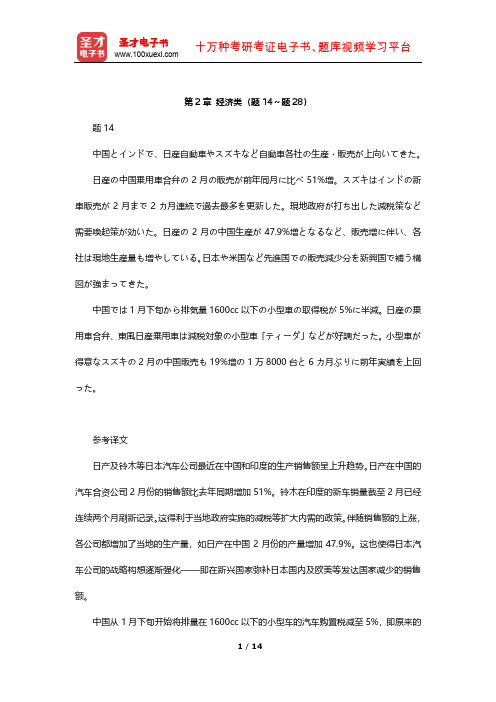
第2章经济类(题14~题28)题14中国とインドで、日産自動車やスズキなど自動車各社の生産・販売が上向いてきた。
日産の中国乗用車合弁の2月の販売が前年同月に比べ51%増。
スズキはインドの新車販売が2月まで2カ月連続で過去最多を更新した。
現地政府が打ち出した減税策など需要喚起策が効いた。
日産の2月の中国生産が47.9%増となるなど、販売増に伴い、各社は現地生産量も増やしている。
日本や米国など先進国での販売減少分を新興国で補う構図が強まってきた。
中国では1月下旬から排気量1600cc以下の小型車の取得税が5%に半減。
日産の乗用車合弁、東風日産乗用車は減税対象の小型車「ティーダ」などが好調だった。
小型車が得意なスズキの2月の中国販売も19%増の1万8000台と6カ月ぶりに前年実績を上回った。
参考译文日产及铃木等日本汽车公司最近在中国和印度的生产销售额呈上升趋势。
日产在中国的汽车合资公司2月份的销售额比去年同期増加51%。
铃木在印度的新车销量截至2月已经连续两个月刷新记录。
这得利于当地政府实施的减税等扩大内需的政策。
伴随销售额的上涨,各公司都増加了当地的生产量,如日产在中国2月份的产量増加47.9%。
这也使得日本汽车公司的战略构想逐渐强化——即在新兴国家弥补日本国内及欧美等发达国家减少的销售额。
中国从1月下旬开始将排量在1600cc以下的小型车的汽车购置税减至5%,即原来的一半。
日产在中国的合资公司东风日产轿车生产的TIIDA等包含在减税对象范围内的小型车的销售情况良好。
以生产小型车著称的铃木2月份在中国的销量也増加19%,达1.8万辆,时隔6个月再次超过上一年度业绩。
题15現在、武漢で行われている全国服装展示会からの情報によると、アパレルブランドの市場戦略が深まるにつれて、国産ブランド服が市場での地位を一段と高め、衣服消費の主流を占め始めた。
今年の中華全国商業情報センターが調査した10種の服装ブランドを見ると、大部分の商品の市場販売ベストテンは国産ブランドで、国外及び合弁ブランドで市場占有率が比較的高いのはТシャツと子供服であった。
2016年华南理工大学硕士研究生入学考试《英语翻译基础》真题及标准答案

2016年华南理工大学硕士研究生入学考试《英语翻译基础》真题(总分:100.00,做题时间:90分钟)一、词语翻译(总题数:27,分数:50.00)1.英译汉2.His son acts a lot of older than his years._________________________________________________________________________________ _____________________________________________________________________________________ _____________________________________________________________________________________ _____________________________________________________________________________________ 正确答案:(他的儿子年纪轻轻却做事老练。
)3.Lucy is impatient of open questions and irritated at her inability to answer them._________________________________________________________________________________ _____________________________________________________________________________________ _____________________________________________________________________________________ _____________________________________________________________________________________ ____________________________________________________________________________________ 正确答案:(露西无法忍受那些没有定论的问题,无法给出答案让她恼火。
2016年华南理工大学英语翻译基础真题试卷(题后含答案及解析)
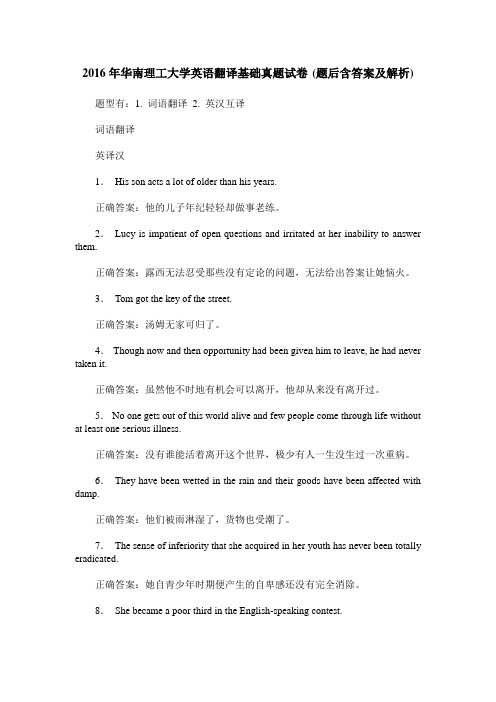
2016年华南理工大学英语翻译基础真题试卷(题后含答案及解析) 题型有:1. 词语翻译 2. 英汉互译词语翻译英译汉1.His son acts a lot of older than his years.正确答案:他的儿子年纪轻轻却做事老练。
2.Lucy is impatient of open questions and irritated at her inability to answer them.正确答案:露西无法忍受那些没有定论的问题,无法给出答案让她恼火。
3.Tom got the key of the street.正确答案:汤姆无家可归了。
4.Though now and then opportunity had been given him to leave, he had never taken it.正确答案:虽然他不时地有机会可以离开,他却从来没有离开过。
5.No one gets out of this world alive and few people come through life without at least one serious illness.正确答案:没有谁能活着离开这个世界,极少有人一生没生过一次重病。
6.They have been wetted in the rain and their goods have been affected with damp.正确答案:他们被雨淋湿了,货物也受潮了。
7.The sense of inferiority that she acquired in her youth has never been totally eradicated.正确答案:她自青少年时期便产生的自卑感还没有完全消除。
8.She became a poor third in the English-speaking contest.正确答案:她在英语演讲比赛中获得第三名,成绩比第二名落后很多。
【2016年华南理工大学考研专业课真题考研真题】翻译硕士
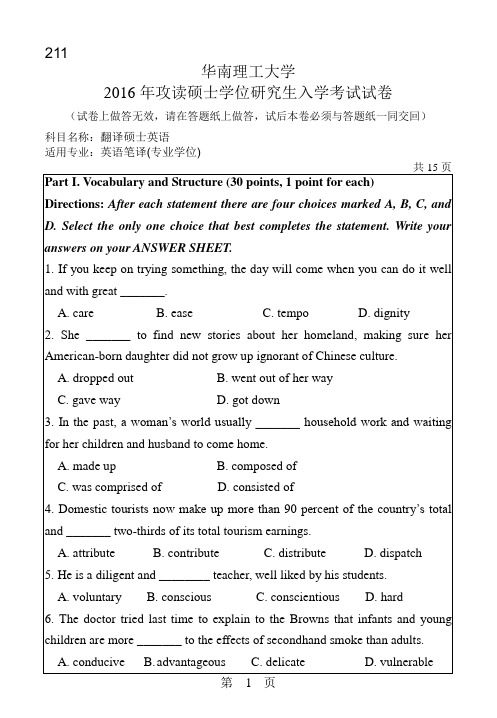
A. asset
B. liability
C. deterrent
D. means
8. She is far too ______ to believe these ridiculous lies.
A. sensational B. sensitive
C. sensible
D. sensuous
9. With _______ audiences and less financial support from government,
共 15 页
Directions: After each statement there are four choices marked A, B, C, and
D. Select the only one choice that best completes the statement. Write your
country’s foreign policy and this policy will not be changed _______ the
international situation may be.
A. whichever
B. however
C. wherever D. whatever
26. The snow leopard is a class-one endangered species ______ is the giant
C. is making
D. are making
19. There________ nothing more for discussion, the meeting came to an end
half an hour earlier.
华南理工大学2018年《359日语翻译基础》考研专业课真题试卷

問題 2.下記のものを中国語に訳しなさい。 (15×1 点=15 点) 1.WHO 2.APEC
第
1 页
3.ダブルディグリー 4.二国間協定 5.小異を残して、大同につく 6.入学式 7.アジア競技大会 8.ストップ高 9.アレルギー 10.エコマーク 11.アカデミー賞 12.口車に乗る 13.手を焼く 14.目から鱗が落ちる 15.歯に衣を着せぬ
2.先生なしでは、上達は望めない。射撃隊のコーチの私は、ピアノについてはま ったくの門外漢だ。そこでレッスンの先生をお願いすることにした。毎週火曜と土 曜の夜、私と娘は一緒に先生のところへ行ってレッスンを受けた。娘の変わりにノ ートを取り、資料を録音した。演奏についての細かい注意事項を、娘の変わりに自 分の目でメモを取り、家に帰ってから、繰り返し娘に話して聞かせた。私は盲学校 に通って点字を覚え、名曲の楽譜をいくつかミンミンのために点訳した。私は娘に 言った。 「志ある者は必ず成功する。 」また、こうも言った。視力を失った盲人にと
359
华南理工大学 2018 年攻读硕士学位研究生入学考试试卷
(试卷上做答无效,请在答题纸上做答,试后本卷必须与答题纸一同交回) 科目名称:日语翻译基础 适用专业:日语笔译(专硕) 共 問題 1.下記のものを日本語に訳しなさい。 (15×1 点=15 点) 1.取长补短 2.恐怖主义分子 3.双赢 4.半决赛 5.颁奖仪式 6.英才教育 7.经济软着陆 8.家庭影院 9.吸尘器 10.音乐会 11.鸡尾酒 12.一衣带水的邻国 13.以史为鉴,共创未来 14.己所不欲,勿施于人 15.近朱者赤近墨者黑 页
第
3
页
って、美しい旋律は、清らかな小川のせせらぎ、露に濡れた花、思う存分遊びわた むれる子鳥のようなものだ。芸術という殿堂に通ずる道は、まず第一歩から始めな くてはならない、と、私は、娘のために、心をこめて一枚の青写真を作り上げた。 ところが、ある日突然ピ題 3.下記の文章を日本語に訳しなさい。 (1×60 点=60 点) 1.国立公园可以定义为这样一种区域,既推进对美丽的大自然和丰润的自然环境的 保护,又促使人们欣赏风景、与大自然亲密接触。为了保护风景和大自然,形成了这 样一种制度。即,如果要在国立公园境内修造建筑物,筑成人工土地等等时,需要取 得许可。即便在同一国立公园当中,保护方式也是有所侧重的。对于自然质量高,重 要或者说核心的部分,比如说就要提高许可标准,严格保护措施。另外,所谓国立公 园,是在人群聚居的国度里,还保存了大块自然的地区。正因为这样,最近人们对国 立公园在保护生物多样性中发挥的关键性作用寄予厚望。
2016年华南理工大学翻译硕士英语真题试卷
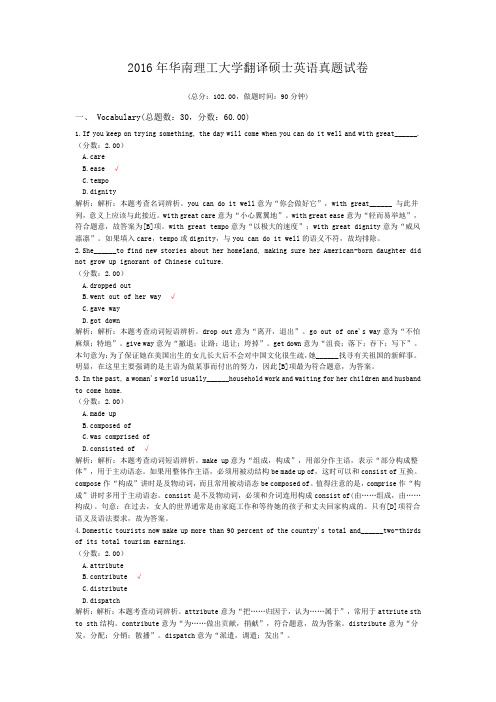
2016年华南理工大学翻译硕士英语真题试卷(总分:102.00,做题时间:90分钟)一、 Vocabulary(总题数:30,分数:60.00)1.If you keep on trying something, the day will come when you can do it well and with great______. (分数:2.00)A.careB.ease √C.tempoD.dignity解析:解析:本题考查名词辨析。
you can do it well意为“你会做好它”,with great______ 与此并列,意义上应该与此接近。
with great care意为“小心翼翼地”。
with great ease意为“轻而易举地”,符合题意,故答案为[B]项。
with great tempo意为“以极大的速度”;with great dignity意为“威风凛凛”。
如果填入care,tempo或dignity,与you can do it well的语义不符,故均排除。
2.She______to find new stories about her homeland, making sure her American-born daughter did not grow up ignorant of Chinese culture.(分数:2.00)A.dropped outB.went out of her way √C.gave wayD.got down解析:解析:本题考查动词短语辨析。
drop out意为“离开,退出”。
go out of one's way意为“不怕麻烦;特地”。
give way意为“撤退;让路;退让;垮掉”。
get down意为“沮丧;落下;吞下;写下”。
本句意为:为了保证她在美国出生的女儿长大后不会对中国文化很生疏,她______找寻有关祖国的新鲜事。
2016-2018年华南理工大学357英语翻译基础硕士研究生入学考试题
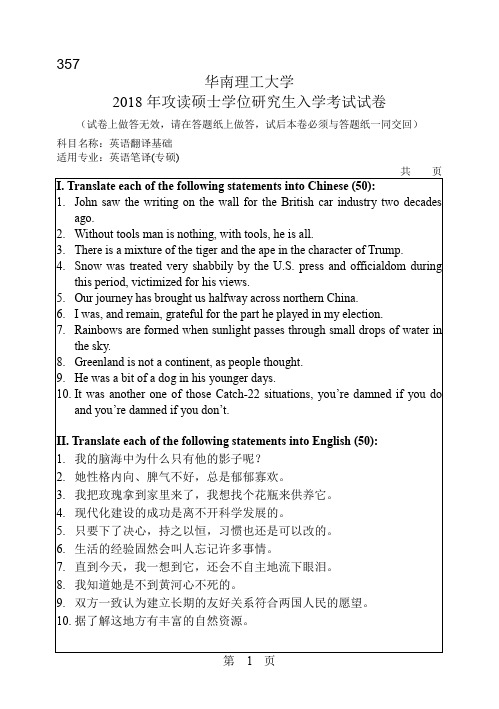
357
华南理工大学
2018年攻读硕士学位研究生入学考试试卷
(试卷上做答无效,请在答题纸上做答,试后本卷必须与答题纸一同交回)
科目名称:英语翻译基础
适用专业:英语笔译(专硕)
357
华南理工大学
2017年攻读硕士学位研究生入学考试试卷
(试卷上做答无效,请在答题纸上做答,试后本卷必须与答题纸一同交回)
科目名称:英语翻译基础
适用专业:英语笔译(专硕)
357
华南理工大学
2016年攻读硕士学位研究生入学考试试卷
(试卷上做答无效,请在答题纸上做答,试后本卷必须与答题纸一同交回)
科目名称:英语翻译基础
适用专业:英语笔译(专硕)。
华南理工大学考研试题2016年-2018年448汉语写作与百科知识

448
华南理工大学
2016年攻读硕士学位研究生入学考试试卷
(试卷上做答无效,请在答题纸上做答,试后本卷必须与答题纸一同交回)
科目名称:汉语写作与百科知识
适用专业:英语笔译(专业学位);日语笔译(专业学位)
448
华南理工大学
2017年攻读硕士学位研究生入学考试试卷
(试卷上做答无效,请在答题纸上做答,试后本卷必须与答题纸一同交回)
科目名称:汉语写作与百科知识
适用专业:英语笔译(专硕);日语笔译(专硕)
448
华南理工大学
2018年攻读硕士学位研究生入学考试试卷
(试卷上做答无效,请在答题纸上做答,试后本卷必须与答题纸一同交回)
科目名称:汉语写作与百科知识
适用专业:英语笔译(专硕);日语笔译(专硕)。
2016年华南理工大学翻译硕士入学考试《英语》真题及详解
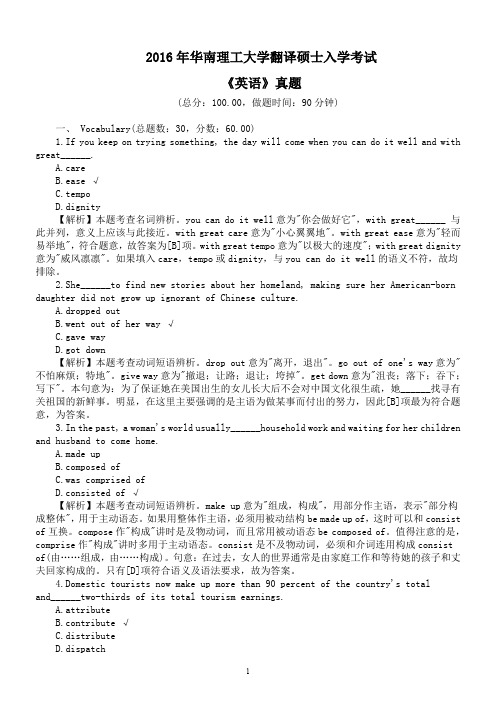
2016年华南理工大学翻译硕士入学考试《英语》真题(总分:100.00,做题时间:90分钟)一、 Vocabulary(总题数:30,分数:60.00)1.If you keep on trying something, the day will come when you can do it well and with great______.A.careB.ease √C.tempoD.dignity【解析】本题考查名词辨析。
you can do it well意为"你会做好它",with great______ 与此并列,意义上应该与此接近。
with great care意为"小心翼翼地"。
with great ease意为"轻而易举地",符合题意,故答案为[B]项。
with great tempo意为"以极大的速度";with great dignity 意为"威风凛凛"。
如果填入care,tempo或dignity,与you can do it well的语义不符,故均排除。
2.She______to find new stories about her homeland, making sure her American-born daughter did not grow up ignorant of Chinese culture.A.dropped outB.went out of her way √C.gave wayD.got down【解析】本题考查动词短语辨析。
drop out意为"离开,退出"。
go out of one's way意为"不怕麻烦;特地"。
give way意为"撤退;让路;退让;垮掉"。
华南理工大学_359日语翻译基础2015--2017年_考研真题

359
华南理工大学
2015年攻读硕士学位研究生入学考试试卷(试卷上做答无效,请在答题纸上做答,试后本卷必须与答题纸一同交回)
科目名称:日语翻译基础
适用专业:日语笔译(专业学位)
共2页問題一.次の日本語の単語を中国語に訳しなさい。
(1点×15=15点)
1.WHO
2.FTA
3.IMF
4.WIN-WIN関係
5.ディスカウントショップ
6.ショートメッセージ
7.ブランド商品
8.オンライン取引
9.一堂に会す
10.関税障壁
11.山に千年、海に千年
12.耳が早い
13.風を食う
14.良薬は口に苦し
15.人材が輩出する
問題二.次の中国語の単語を日本語に訳しなさい。
(1点×15=15点)
1.经济软着陆
2.关贸总协定
3.臭氧层
4.高清
5.移动办公
6.讲义大纲
7.英才教育
8.小康社会
9.中日邦交正常化
10.世界锦标赛
11.无风不起浪
12.渔翁之利
13.开动脑筋
14.百闻不如一见
15.以毒攻毒
第1页。
2016年华南理工大学研究生入学考试专业课真题830_法学综合二(含民法总论、经济法总论、刑法总论)
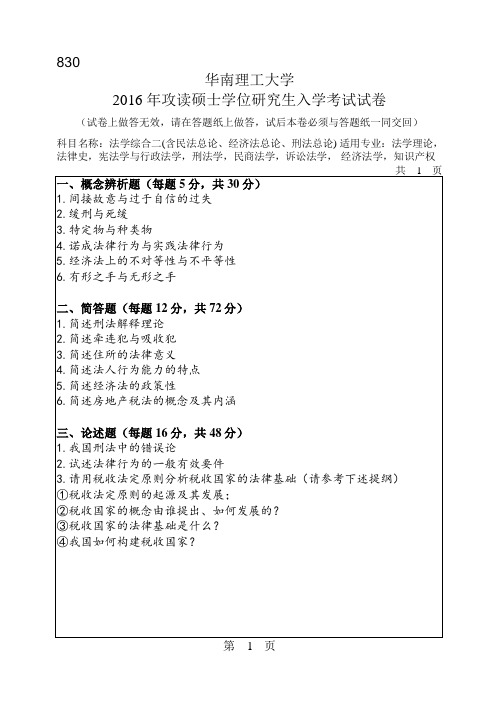
830
华南理工大学
2016 年攻读硕士学位研究生入学考试试卷(试卷上做答无效,请在答题纸上做答,试后本卷必须与答题纸一同交回)
科目名称:法学综合二(含民法总论、经济法总论、刑法总论) 适用专业:法学理论,法律史,宪法学与行政法学,刑法学,民商法学,诉讼法学,经济法学,知识产权
共 1 页
一、概念辨析题(每题5 分,共30 分)
1.间接故意与过于自信的过失
2.缓刑与死缓
3.特定物与种类物
4.诺成法律行为与实践法律行为
5.经济法上的不对等性与不平等性
6.有形之手与无形之手
二、简答题(每题12 分,共72 分)
1.简述刑法解释理论
2.简述牵连犯与吸收犯
3.简述住所的法律意义
4.简述法人行为能力的特点
5.简述经济法的政策性
6.简述房地产税法的概念及其内涵
三、论述题(每题16 分,共48 分)
1.我国刑法中的错误论
2.试述法律行为的一般有效要件
3.请用税收法定原则分析税收国家的法律基础(请参考下述提纲)
①税收法定原则的起源及其发展;
②税收国家的概念由谁提出、如何发展的?
③税收国家的法律基础是什么?
④我国如何构建税收国家?
第 1 页。
浙江理工大学359日语翻译基础2016年考研专业课真题试卷

問題二、次の語句を日本語に訳しなさい。(1 点×15=15 点) 1.画蛇添足 2.良药苦口 3.直觉 4.网球 5.录像带 6.眼珠 7.游泳衣 8.汽油 9.胡须 10.荷花 11.董事长 12.窗帘 13.俱乐部 14.银行帐户 15.尺码
第 1 页 ,共 2 页
問題三、次の短文を日本語に訳しなさい。(30 点×2=60 点) 1. 中国人民抗日战争和世界反法西斯战争,是正义和邪恶、光明和黑暗、进步和反动的大决 战。在那场惨烈的战争中,中国人民抗日战争开始时间最早、持续时间最长。面对侵略者,中华 儿女不屈不挠、浴血奋战, 彻底打败了日本军国主义侵略者,捍卫了中华民族 5000 多年发展的 文明成果,捍卫了人类和平事业,铸就了战争史上的奇观、中华民码:359
(请考生在答题纸上答题,在此试题纸上答题无效)
問題一、次の語句を中国語に訳しなさい。(1 点×15=15 点) 1.ストレス 2.プライバシー 3.さっさと 4.竹馬の友 5.天気屋さん 6.私腹を肥やす 7.ホームシック 8.エコロジー 9.ビザ 10.皮肉 11.無邪気 12.データ 13. 迷子 14. フィールド 15. 丈夫
第 2 页 ,共 2 页
2. 日本では仕事の中でも労使の協調関係は生かされている。日本の多くの会社は、新しい 提案などを決裁するときにトップだけで決めるのではなく、課長や部長など中間管理職の同意 を得てから決定することが多い。提案は、経営幹部よりも現場の働きを働きを把握している部 課長によってなされ、また、平社員の提案は課長が取り上げるべきかを決めるのが一般的だ。
来成为日本历史上著名的书法家。 千百年来,中日两国间的书法交流从未间断,书法艺术犹如一条彩带,把中日两国民族间的
深情厚谊紧紧连在一起。
